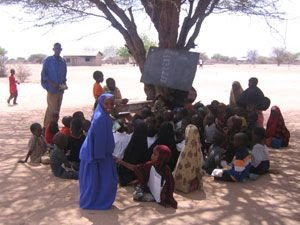nngu007
JF-Expert Member
- Aug 2, 2010
- 15,862
- 5,797

A man tries to locate Nairobi on a computer through the Google Earth programme. TPersonal computers have changed the way that we work, and lovely as they are it does mean that developing countries now have to worry about their ICT sector and technology adoption the way they used to worry about roads and schools. Photo/MICHAEL MUTE By Elsie Eyakuze
Posted Sunday, October 23 2011 at 17:32
It used to be enough to know how to read and write - not so long ago, these were skills that would help you move a few steps towards success in the world.
This is still the case but these days there's a whole new dimension to literacy that perhaps no one could have foreseen even just a decade ago.
Personal computers have changed the way that we work, and lovely as they are it does mean that developing countries now have to worry about their ICT sector and technology adoption the way they used to worry about roads and schools.
Toys no more
Electronic gadgets were once toys, fascinating things with limited utility that showed off your good taste and affinity for cutting-edge plastic goods.
These days, to be fully literate in the world means knowing how to read and write in a physical sense, and then being able to master the intricacies of a qwerty keyboard or a mobile keypad, a mouse, a touchpad and doing it all over again electronically.
Oh, and of course owning the means to do this work.
Affordable, democratic pen and paper are no longer enough, which is where things get interesting. There is a social justice element to computing that is becoming increasingly relevant, especially in the age where the Internet is becoming almighty.
Gadgets cost money.
Hardnosed realists will tell you that in a country as poor as Tanzania, encouraging the adoption of computers is not the best place to focus your attentions or energies.
There are a number of valid points supporting this: The devices really do cost quite a bit of money, and then there's the electricity problem that makes having gadgets a bit of a waste of time outside the urban centres, high-cost slow-speed Internet and a literacy rate that is not quite in keeping with the demands of the current age. Not to mention, what on earth is the Internet supposed to do for poverty alleviation?
But these challenges are good ones to have, in the greater scheme of things.
Failure in this field doesn't cost human lives whereas successes can cause a dramatic improvement in the quality of life.
Which is where the idealism comes in - what we are looking at is simply the next frontier.
As we individually imagine what Tanzania will look like in the next 50 years, a large part of my vision includes seeing a mobile computer-slash-phone thingy in every Tanzanian household. If things go right, forget the battery-powered village radio: In another decade or so we'll be gathering around the communal consoles to do business, catch up on news from around the world, get directly in touch with our elected politicians, attend school, and a host of other services I don't have the imagination to enumerate.
Globalisation
Because that's the key thing about the computing side of globalisation: It has created a world limited only by our imagination.
Like many who grew up in the dawn of the computing age, I am mostly self-taught.
However, there is one longhaired, black-wearing teacher in my past who passed on two fundamentals that have yet to let me down: Learn how to touch-type, and play computer games.
It sounds a bit counter-intuitive for a computer teacher in the 1990s, but he was an Apple fan and ultimately turned out to be more effective than the instructors who tried to persuade us to program.
And now we live in a post-Jobsian world. Computers as they work these days collapse the walls between work and play, and increasingly through social media they are bridging the gap between the personal and the public.
With the Internet becoming increasingly accessible, physical distance is becoming negligible.
The planet has witnessed the emergence of the communal human superbrain, and it lives online.
Information in the blink of an eye, saving the time that it used to take to go to a library or a bookshop or an expert.
So it might sound elitist to say that we should be aiming for as many touchscreen computers and phones as we can afford across the country when there are daily challenges of income and basic services, but it isn't.
Once upon a time, only the clergy were allowed literacy at all, and look how far we've come. Companies that have worked to serve the needs of people have done incredible things in the past couple of years.
The technology and services are becoming cheaper, faster, better and more useful.
Since the foundations are pretty much there, we should be aiming to get as many Tanzanians into the superbrain as we can, because that's where the potentials of the next 50 years lie.
